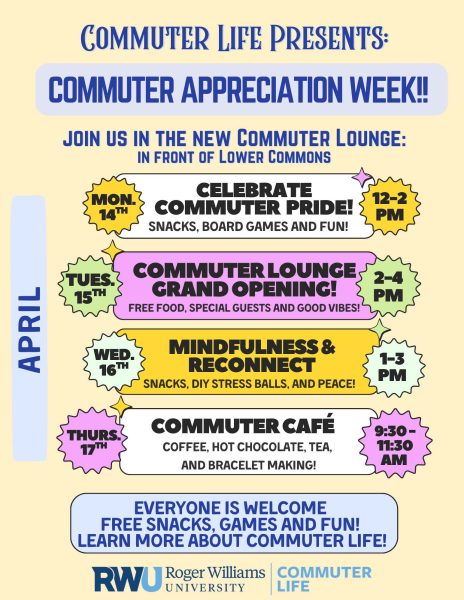How Developmental Advising Shapes RWU’s Registration Process
Registering for next semester’s classes can be stressful for anyone. Between understanding credits and managing to plan a schedule that allows for work-study, clubs and enough time to do homework and study, the process can be overwhelming. Luckily, Provost and Senior Vice President for Academic Affairs Margaret Everett, and Assistant Provost for Student Success Allison Chase Padula, are working to make the advising process as helpful as possible for all Roger Williams University students.
As for who becomes faculty advisors at RWU, Chase Padula said, “Faculty members here have academic advising as one of their responsibilities. Every faculty member here has a case-load of students that they are responsible for, for academic advising, and that’s assigned by the departments, by major.”
She also said advising workshops are provided to faculty members to train and this summer an academic advising guide/manual for all faculty will be developed.
Everett said in new faculty orientation there is a lot of emphasis on advising because “it is such an important expectation here, it’s not as large an expectation at other institutions so we really want our faculty to understand our approach to advising, what we consider developmental advising.”
Developmental advising is different from how universities typically tackle advising.
“The way we think of the faculty members’ role in advising is beyond the sort of, transactional, ‘Let’s make sure you’re registered for classes and there is no conflict in your schedule,’” said Everett.
“Obviously that’s really important, but what we really like for the faculty to focus on with students is their goals, and their interests and developing their interests, and be exploring careers and maybe an interest in graduate school, if that is a goal for the student, and then working on the academic schedule to help students build toward those goals.”
Chase Padula said she thinks faculty really enjoy having an advisor role to students because “not only do they get to share their expertise in a particular field, but they also get to know students on a personal level.”
A point of emphasis Chase Padula said she shares with faculty is that advising should be a conversation not a transaction and students should talk with their advisor before registration to develop a relationship with them.
Developmental advising requires students to be active participants in their relationship with their academic advisor, which can be stressful for some students.
The advising department offers what Chase Padula called a preparation for advisement sheet that is sent to first-year students. The sheet allows them to write down questions to bring up to their advisor and advising has questions already on the sheet for students to ask.
“I think students should go into that meeting with their faculty advisor having thought about some of the things they want to talk about in that conversation,” said Chase Padula. “It helps the student feel totally prepared, and in the driver’s seat for that conversation.”
Everett said she agreed with Chase Padula’s statement.
“I remember myself, that can be stressful, and obviously we don’t want it to be stressful for students, but I think Allison’s really right, the more the students can give some preparation and some planning for that conversation, the more helpful it can be,” said Everett.
Advisors should be the first contact for students having trouble scheduling according to Everett.
“If students are having trouble getting the schedule they want, talk to your academic advisor, and that’s always the first point of contact, but I also always want to say there are lots of people here to help students, Center for Student Academic Success, the Deans are very available to students,” said Everett. “If you aren’t able to get the assistance you need, or if it’s a question that your faculty advisor cant answer, by all means, reach out to those other offices, we are all here to help the students”
Chase Padula said peer mentors would be good for students to contact and work with during registration. Mentors are on the second floor of the Center for Student Academic Success Advising and Peer Mentorship Office during registration where students can go if help is needed.
Early on in college students may not know all their career goals and Chase Padula said that is okay.
“It’s okay if you don’t know what your goals are, but maybe what are some interests you have and an honest conversation about where you are struggling, and the more open you can be about that the more helpful your advisor can be,” said Chase Padula.




